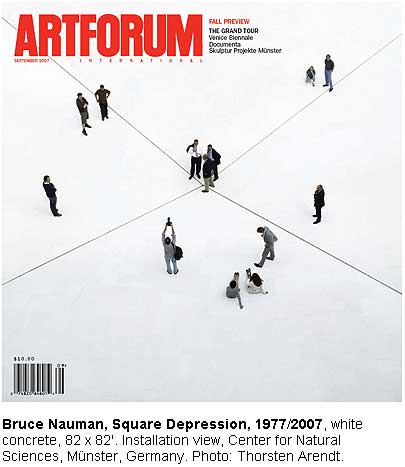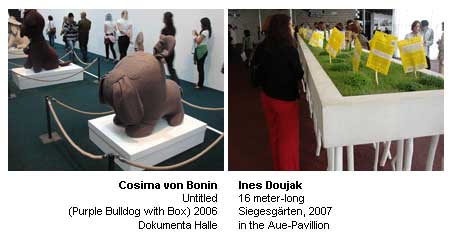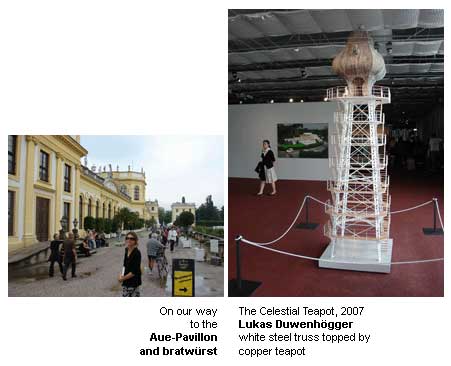All Entries: September 2007
Monday, September 24th, 2007
Artforum Top Ten Makes Artist Organized Art Number One In September 2007 Issue Don’t take our word for it, click through. http://artforum.com/inprint/id=15664
Don’t take our word for it, click through. http://artforum.com/inprint/id=15664
#permalink posted by Artist Organized Art: 9/24/07 04:36:00 PMWednesday, September 19th, 2007
LIVE FROM CAMOUFLASH: Artist Organized Art will be reporting from Poland at Camouflash,
an international artists meeting event and exhibition to be held at the
Patio Art Center, of The Academy of Humanities and Economics, in Łódź, Poland.
The show will take place 12-27 October 2007, opening on friday, 12 October.
Stay posted for coverage, documentation, commentary, interviews and more.
International Artists Meeting
12 – 27 października 2007
curator: Mariusz Sołtysik
rationale: The contemporary culture is rather pictorial in nature, idea has been marginalised. The plethora of pictures in our lives induces a sense of being lost, or immunises us against them by creating and augmenting trite reception of such pictures, which, consequently, makes them neutral (e.g. another murder). Obviously, such trite and superficial reception is also true of religion, art and its products. On the other hand, noticeable social behaviours indicate an urge to appear in the media in a short flash of an advertisement or reality show. This urge replaces the essential question: “what idea do I want to pass across?” or “what is my principal message?” People appear to participate in the social and cultural life, but on the level of entertainment, rather than inclusion or reflection on human existence. The present-day society seems to be complex, however, following the thought of Jean Baudrillard, it is rather a mass that is “an opaque nebula whose growing density absorbs all the surrounding energy (…), to collapse finally under its own weight. A black hole which engulfs the social.” Before the black whole is formed, however, there is a short, yet spectacular explosion, followed by a collapse of a massive star. Relating this to human behaviours, perhaps this flash is the one and only opportunity to step out of obscurity before disappearing and being absorbed by the mass? To what extent, then, is this flash true and is not a camouflage, a desire to be somebody else for a moment? It seems that just to induce the question “who am I and what am I doing?” is in itself a great success. Mariusz Soltysik The Camouflash
artists:
Janusz Baldyga – Poland; Olga Bergman – Iceland; Charlie Citron – Nederland;
Martina Galvin – Ireland; Kristaps Gulbis – Latvia; Shilpa Gupta – India;
Jessica Higgins – USA; Gabriele Horndasch – Germany; Ahn Hyun-Ju – Germany;
Eric Van Hove – Belgium; Adam Klimczak – Poland; Erika Knerr – USA;
Anna MacLeod – Ireland; Christine Mackey – Ireland; Tomasz Matuszak – Poland;
Aisling O’Beirn – Northern Ireland; Mariusz “Benek” Olszewski – Poland;
Mariusz Sołtysik – Poland; Ewa Szczyrek-Potocka – Poland; Suzy Sureck – USA;
Richard Thomas – Australia; Miyuki Yokomizo – Japan and others…
#permalink posted by Erika Knerr: 9/19/07 10:02:00 PMThursday, September 13th, 2007
Dokumenta, Kassel, Germany, 6.16-9.23.07
artist Susannah Auferoth revisits
DOKUMENTA 12Expecting to encounter a huge global audience speaking unidentifiable languages, my German husband Dirk and I drove from Münster to Kassel to attend Dokumenta 12. Instead we found a rather sedate, socks-with-sandals crowd which gave us loads of time to peruse the actual art and grounds.
The exhibition is very post-war German in it’s presentation; sincere, exploratory, and with a bit of precise humor. Dokumenta is set in six buildings in the city of Kassel, most within walking distance of each other, the exception being the Schloss Wilhelmshöhe set within the Bergpark. There is one other building taking part in Dokumenta this year in Roses, Spain which we didn’t see.

In Museum Fridericianum, the first venue we visited, I was immediately drawn to Hu Xiaoyuan’s delicate and creepy hair-of-the-artist embroidery on white silk (wooden embroidery rings still in place) bearing images of lips, peacocks; flora. It occurred to me that a lot of art making, my own included, could pass for small slices of OCD fixations. Not far from that stands Zheng Guogu‘s rectangular waterfall of wax-dipped calligraphic texts culled from amateur (ie non-elite) calligraphers. Serene and stylized, the wax drips formed shapes reminiscent of ancient Chinese depictions of wave spray and mountain trees, and, possibly, Scooby-Doo graphics.
Moving on, we encountered Iole De Freitas’ large steel and plexiglass panels swooping through the formal space and appearing to penetrate the walls and hover along the facade. It occurred to me as I ducked over and around the barriers that I was following a persons line of sight which led both Dirk and I to consider that it worked as a segue for the next rooms artwork, which, it so happens, we have forgotten.
Die grosse Ausstellung hat keine Form, hence the works were scattered chronologically, geographically, and…..it worked! Once you stop yourself from trying immediately to answer who-what-why-where you enter into the Dokumenta 12 zone and accept willingly all things presented. If you fight it, fatigue will set in. Are those soggy puzzle pieces in front of Dokumenta Halle part of the show?

While in the midst of Iñigo Manglano-Ovalle’s Phantom Truck installation in the Dokumeta Halle, Dirk and I both shuddered and said ‘WMD’ to one another. We moved on and found the exhibition deeper than we ever imagined. I wanted to have sleepover in the Aue-Pavillion, even more so after I accidentally walked into Gerwald Rockenshaub’s artwork which was soft and large and warm. (thought bubble: Dokumenta as sleep-over space) Monika Baer’s large eerie vampire painting gave us pause. Dirk spent time trying to decipher her vaporous iconography while I wondered about the use of Prussian blue and the Brothers Grimm, who wrote many of their stories in Kassel.
One wonderful addition to the entire exhibition was Ai Weiwei’s 1001 Quing dynasty chairs placed in small conversational groupings throughout the venues. Almost too good to be true, you were allowed to sit on them. They had been used to form part of a Fairytale event (again, Brothers Grimm) where Chinese citizens were invited to a taste of non-China. I did not witness the event but sat in these beautifully-formed wooden chairs staring directly into the eyes of other weary, culture-soaked attendees. The intimacy was palpable and, therefore, nicely comical.
Romuald Hazoumé constructed a boat out of plastic cannisters for his Dream installation. The boat won’t float: it’s full of gaping holes from the cannister openings. The piece reminded Dirk and I of being on a almost deserted tropical island and discovering a white sand beach covered with hundreds of seaweed-covered plastic cannisters.
Containers and what they contain…what different societies carry on their backs. That’s very much the gist of the show right there.
Susannah Auferoth
#permalink posted by Susannah Auferoth: 9/13/07 09:12:00 PM



